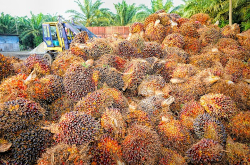과테말라의 팜유

The palm oil industry is growing in Central America. And in Guatemala, the product has become a major export.
Supporters say the industry creates jobs and investment in areas where poverty and violence have led to waves of migration. However, critics say the industry is also a cause of such flight.
Raxruha, Guatemala, is among the towns experiencing an outward flow.
Palm oil farms have made subsistence farming there increasingly hard for the town’s 40,000 people. Some have sold land to palm oil producers.
Opponents of the palm oil industry argue that farmers are giving up their land to take up jobs that do not pay well enough to keep them in Raxruha.
Cesar Castro is the town’s mayor. He says money from land sales has been used to pay smugglers.
“These people get the money, and they go to the United States, and the vast majority come back to find more poverty and end up employed as workers on their own land,” he said.
Jakelin Caal was from Raxruha. She was the 7-year-old girl who died of a blood infection while in detention at the U.S. border in December. Her relatives said she left Raxruha with her father because he was struggling to earn enough as a corn farmer to support his family.
Smugglers tell families that having children with them can make it easier to enter the U.S.
Jakelin’s uncle said work on the palm oil farms is very hard. He told Reuters that he earned $7.80 a day for working 12 hours, or below Guatemala’s legal minimum wage for agricultural work.
The palm oil producer is called Industria Chiquibul.
Reuters reports that the labor rights group National Council for Displaced People of Guatemala discussed the low pay issue in 2016 with the American company Cargill. It is a big buyer of palm oil.
Cargill said it works closely with "suppliers to ensure that all supply chain practices support the United Nations’ goals to provide people with decent work.”
Palm oil has become an important ingredient in food, soaps and fuel around the world. The oil became very popular after other less healthful oils were banned in many places.
Reuters reports that the United Nations’ World Health Organization (WHO) has prepared a report that questions whether palm oil is as healthy as believed. The WHO calls for more research on palm oil and more rules for the industry. It compared the methods of industry supporters to those used by the tobacco and alcohol industries, Reuters reports.
Indonesia and Malaysia are the largest producers of palm oil. However, Guatemala has become one of the biggest producers in the Americas, with exports of 727,000 tons in 2017.
One farmer told Reuters he felt as though he was forced to sell his land to Chiquibul. Others say criticism of the palm oil companies is unfair because they provide jobs.
Hector Herrera is with the palm oil producer NaturAceites. He said his company has created thousands of jobs and invested in roads, schools and health centers.
NaturAceites says most of the land it operates in Guatemala had been intensively used to raise cattle before it was used for oil palms.

